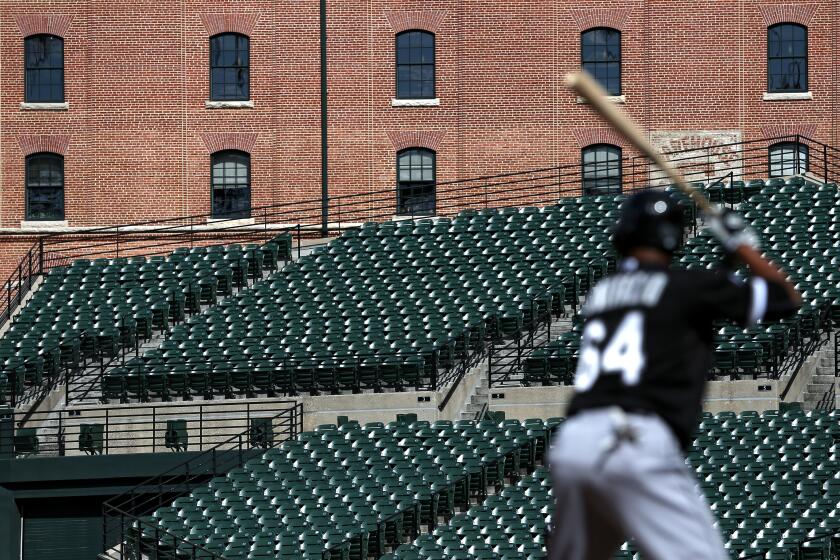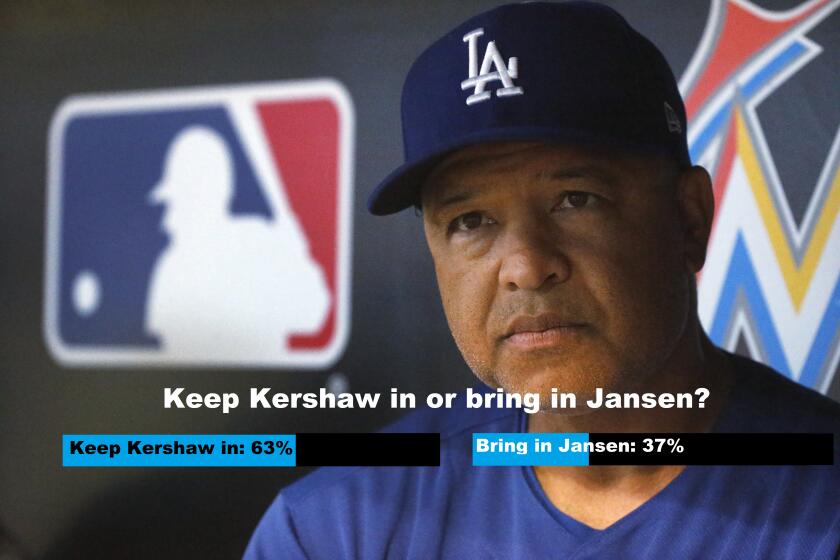Column: Longtime Dodger Stadium ticket taker leaves a lasting impression on one family
- Share via
The email was from a lifelong Dodgers season-ticket holder, saddened by the postponed season. He wanted to connect with his favorite part of Dodger Stadium.
He wanted to find the guy who takes his ticket.
He knew him only as Errol.
“I just want to make sure Errol is doing OK,” Stan Brooks said.
For more than 20 years, Brooks has accessed his field-level seats through a right field gate manned by someone he only knew from the first name on his badge, yet someone he considered part of his family.
“Errol has always been there,” said Brooks, 61, a director-producer. “Year in, year out, no matter what is going on in my life, when I come to Dodger Stadium and Errol is standing there and smiling, all is right with the world.”
Over the years, Errol has hugged Brooks’ father, fist-bumped his children, participated in a family video, posed for family photos, bonding for five minutes every night at a baseball game.
Errol became such a constant and comforting fixture in their lives that the Brooks family instituted an ironclad rule. They would only enter a Dodgers game through Errol’s station. Even if the line was shorter elsewhere or if Errol was helping another ticket taker, they would patiently stand and wait until they would pass by Errol and enjoy chatting about everything from the weather to his bowling scores.
Pro sports plan to play in empty venues because of the coronavirus outbreak, but examples of events occurring without fans is sparse.
“He is as important to Dodger Stadium as the architecture,” Brooks said. “Basically, our gateway to the Dodger games is through Errol.”
So now, they missed him. And as the coronavirus pandemic shutdown dragged on, they worried about him. What about his loss of income? Did he need help? How was he handling being away from his Dodgers family?
Brooks, known in local baseball circles as the founder of the nonprofit Hollywood Indies Little League in South Los Angeles, contacted me in hopes of identifying and locating Errol.
The search required all of one phone call.
He is Errol Coffey, 76, a ticket taker for 42 years, and as much a part of Dodger Stadium as the Elysian Hills.
He has worked roughly 3,500 games, assisted in the stadium entrance of some of roughly 130 million fans, bore witness to six World Series and some of the greatest moments in Chavez Ravine history.
Yet he had no idea that, for at least one family, he was an important part of that history.
“A fan misses me?” Errol said when I reached him. “Really?”
:::
If you attend enough sporting events, you probably wind up making a special connection with at least one game-day employee. Think about it. Maybe an usher? A concession worker? The eternally patient woman who operates the elevator?
You might only know them by their first names, but their presence makes a lasting impression. They are the human faces that welcome us into an impersonal space. They are the reliable presence lugging beers down the aisle or the constant figure patrolling the top of your section. They make a giant place seem small.
James, Maria, Richard, Howie, Henry and A.B. are some of the many game-day employees who have touched my life. You probably have your own list. It is impossible to imagine the games without them.
“The seats are only as comfortable as the people around them,” said Dodgers broadcaster and former pitcher Orel Hershiser, who is known for engaging everyone from ushers to security guards. “The game-day employees are what make the experience at any game so special.”
MLB stadiums without fans would be like playing in a giant television studio. TV executives offer ideas on reinventing baseball as entertainment.
Now that the pandemic has wiped out the games, those employees have become like longtime friends who suddenly disappeared. Maybe you wonder how they’re doing. Maybe you wonder if they’re making ends meet, particularly the baseball workers who could miss 81 games’ worth of hourly wages while being reimbursed only several hundred dollars each by their teams, barely enough to cover one homestand.
Maybe you think about them like Stan Brooks thought about Errol Coffey.
“Every opening day for the last 20 years, driving to Dodger Stadium, I say, ‘Oh, God, I hope Errol is still there,’” Brooks said. “Then this year there was no way to know, and I had to find out.”
Had the Dodgers been playing, he would have been there, standing at pretty much the same place he’s been since 1977, when he joined the Dodgers to supplement his income as a court administrator.
“I’ve been threatening to retire for five years,” Errol said with a laugh. “I just haven’t gotten around to it.”
By the time Brooks showed up, Errol would have been at the ballpark for several hours, standing tall with a warm smile that belies his aching feet.
“I’ve tried every type of tennis shoe, every type of pad, and still they hurt,” he said. “The years have taken their toll.”
“There’s thousands of fans and only one of me. It’s nice to think I can make an impression.”
— Errol Coffey
He endures the pain without much reward. He stands with his back to the game. His shift ends two hours after the first pitch, so generally he is walking into his Ladera Heights home before the Dodgers are walking off.
He doesn’t do it for the baseball, because he rarely sees any. He doesn’t do it for the cheers, because he never hears any.
“I just like representing the Dodgers, making people feel comfortable when they come to a ballgame,” he said. “I’ve seen generations of families come through those gates, and I’m glad to be part of that.”
The respect for Errol runs through the Brooks family, and Stan’s three sons now insist their friends only walk through his gate, the tradition slowly spreading through an entire community of Dodger fans.
When Simon, 28, was graduating from high school, Errol posed for a photo while holding up a “Happy Graduation Simon!!!” sign. The family turned the photo into a giant poster that greeted everyone at the front of door of the restaurant where they celebrated.
Said Simon: “Seeing Errol in that giant photo, it was so sick, everyone was so fired up, it was like we got a picture with Kobe.”
Said Errol: “I’ve never done something like that before. It was nice.”
Then there was the time that son Jesse, 26, was collecting video greetings from friends and family members for Stan’s 60th birthday.
“I thought, ‘Who are all the touch points in my Dad’s life?’” he said. “And I knew Errol was one of them.”
Jesse brought his camera to the stadium and recorded Errol offering his birthday wishes with a hearty cry of “Just do it!” His appearance in the video shown at Stan’s party brought down the house.
“There’s thousands of fans and only one of me,” Errol said. “It’s nice to think I can make an impression.”
Still, it’s strange. Errol was surprised when I contacted him about Brooks. He was tentative when he called Brooks. Their initial conversation was short and a bit awkward.
“You have to understand, nobody really contacts me like that,” Errol said. “Management preaches that we’re all part of one big Dodger family, but you never expect to hear from somebody like that.”
Soon, though, they were chatting about Brooks’ father and children and all those decades of games where brief encounters became an enduring history.
“I was like, ‘Of course I know who you are, I’ve seen your family grow up,’” said Errol. “A lot of years there, it’s very special.”
Errol politely declined Brooks’ offer of financial help, but the conversation eventually flowed, the connection was forged again, and last weekend Brooks drove to Errol’s home.
There, at the end of his driveway, wearing masks and gloves and standing far apart, the two men had their opening day.
Brooks brought a care package, Errol offered a shy smile, and together they chatted for about 15 minutes under a glorious Saturday sun, talked about their families, their Dodgers, baseball momentarily beating the pandemic, their hope springing eternal.
No ticket required.
Pro sports plan to play in empty venues because of the coronavirus outbreak, but examples of events occurring without fans is sparse.
More to Read
Are you a true-blue fan?
Get our Dodgers Dugout newsletter for insights, news and much more.
You may occasionally receive promotional content from the Los Angeles Times.













